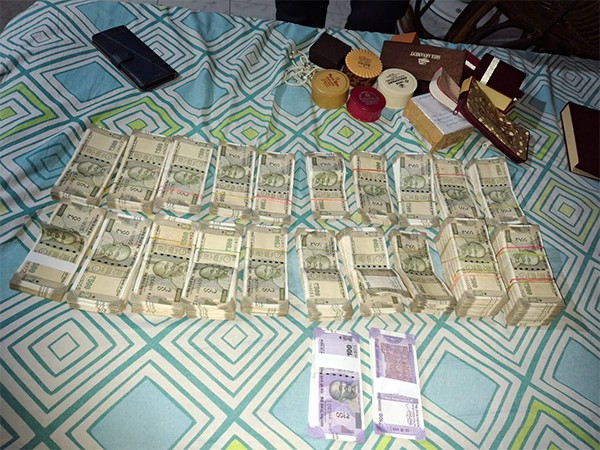The Geopolitical Ripple Effect: How an Iranian Attack on Israel Could Influence Gold and the U.S. Dollar
Oct 10, 2024

VMPL
New Delhi [India], October 10: The geopolitics of the Middle East has long been fraught with tension, especially between Iran and Israel. Given their entrenched positions, any military confrontation, particularly an attack by Iran on Israel, could have profound implications not only for the region but also for global financial markets.
Among the critical assets that investors watch closely during geopolitical crises are gold and forex trading in the U.S. dollar. Gold has historically been seen as a haven asset during times of uncertainty, while the dollar serves as the world's primary reserve currency, often reacting predictably to global instability. Understanding how these two assets could respond amid heightened tensions between Iran and Israel is vital for investors and policymakers.
Historical Context of Iran-Israel Relations
To understand the potential consequences of an Iranian attack on Israel, one must first appreciate the deep-seated animosities that characterize their relationship. Since the Islamic Revolution of 1979, Iran has positioned itself as a principal adversary of Israel, often referring to it as "the enemy." This hatred is rooted in ideological, religious, and geopolitical factors, leading both nations to engage in activities that indirectly undermine one another.
The ongoing tension has manifested in various ways, including proxy conflicts in Lebanon, Syria, and Gaza. Iran's support for groups like Hezbollah and Hamas, alongside Israel's retaliatory strikes, has created a volatile security environment in the region. An outright attack by Iran would not only exacerbate these existing tensions but could also draw in other nations, complicating the geopolitical landscape further.
Immediate Effects on Gold
Gold has long been considered a haven asset, and its price tends to rise during geopolitical uncertainty. If Iran were to launch an attack on Israel, several immediate effects on gold could be expected:
Flight to Safety
Investors often seek safety during crises, directing their funds toward reliable assets like gold. An Iranian attack could spark fears of broader regional conflict, triggering a significant influx of capital into gold markets. Such a surge could rapidly increase gold prices, potentially breaking established resistance levels.
Volatility in Financial Markets
In the wake of military escalation, stock markets often react sharply to uncertainty, commonly resulting in negative sentiment across equities. Historically, when financial markets are volatile, gold prices tend to soar as investors seek to hedge against losses in equities. This pattern may repeat itself if Iran were to initiate a military offensive against Israel.
Inflationary Pressures
Military conflicts often lead to expectations of increased government spending and potential disruptions in oil supplies. If conflicts result in rising energy costs, inflation expectations could rise, further driving demand for gold as a hedge against currency devaluation and loss of purchasing power.
The U.S. Dollar's Reaction
As the world's dominant reserve currency, the U.S. dollar is intricately linked to global trade and finance. Numerous factors would influence the reaction of the dollar to an Iranian attack on Israel.
Increased Demand for the Dollar
During periods of global crisis, the dollar often strengthens as investors flock to it for safety. This phenomenon, known as the "flight to quality," usually occurs because the dollar is viewed as the most stable currency. If an Iranian attack stirred widespread unrest in the Middle East, the demand for the dollar could surge as market participants seek liquidity and safety.
The U.S. dollar is currently the world's primary reserve currency. This designation means that the dollar is widely held by governments, central banks, and financial institutions as a part of their foreign exchange reserves.
The U.S. dollar is trusted for its stability and widespread acceptance in international trade. This leads countries and investors to prefer it for trade transactions and as a store of value.
Many international transactions, including trade of commodities like oil, gold, and food, are conducted in dollars. This ensures ease and standardization in global trade markets, as parties usually engage in contracts denominated in dollars.
Impact on Monetary Policy
The dollar's status means that U.S. monetary policy can have far-reaching consequences on the global economy. Changes in interest rates by the Federal Reserve can influence exchange rates, capital flows, and economic conditions in other countries.
Impact on Oil Prices
The Middle East is a critical region for oil production, and any military conflict could destabilize oil supplies. If oil prices spike due to an Iranian attack on Israel, it could lead to a stronger dollar, especially if the U.S. is poised to benefit from increased energy exports. Higher oil prices often correlate with higher dollar valuations, impacting the broader market.
Federal Reserve's Policy Response
The Federal Reserve's monetary policy will also play a crucial role in shaping the dollar's reaction. If geopolitical tensions lead to significant market volatility, the Fed may opt for measures like interest rate adjustments or quantitative easing to stabilize the economy. Such actions can have complex implications for the dollar's value; depending on investor confidence, this may either strengthen or weaken the currency.
Broader Implications for Global Markets
The potential for conflict between Iran and Israel amplifies market volatility across various asset classes. Stock markets typically react negatively to geopolitical crises, leading to sell-offs in equities. The interconnectedness of global markets means that investors will closely monitor developments in the Middle East, and the resultant uncertainty could impact asset allocations worldwide.
Regional Spillovers
An Iranian attack could have consequences beyond Saudi Arabia and Israel, potentially destabilizing neighboring countries like Lebanon, Iraq, and even Saudi Arabia. Such regional implications would further complicate the geopolitical landscape and lead to substantial market fluctuations, affecting global asset classes. Investors might seek refuge in safe havens, which could create a cascading effect on gold prices and currencies, further influencing market sentiment.
Long-term Considerations
While the immediate reaction of gold and the dollar to an Iranian attack on Israel would be critical in the short run, understanding the longer-term implications is equally essential for investors and policymakers.
Gold as a Long-term Hedge
The price of gold may experience sustained increases if geopolitical tensions persist. A protracted conflict in the Middle East could lead to an ongoing demand for gold as a hedge against inflation, currency devaluation, and geopolitical uncertainty. Investors might diversify their portfolios by increasing their allocation to gold during these periods, reinforcing its role as a long-term safe haven.
Structural Changes in Currency Dynamics
A significant military conflict could also shift the dynamics of currency markets. If the dollar appreciates sharply in the face of a crisis, it could inadvertently affect emerging market economies reliant on dollar financing. Such strain might lead to calls for alternative reserve currencies or a push toward de-dollarization, especially among countries looking to reduce their dependency on the U.S. dollar amidst global instability.
Risk of Escalation
Any military confrontation involving Iran and Israel has the potential to escalate into broader conflicts involving regional powers and their allies. Such escalations could lead to sustained instability that creates a cyclical pattern of rising gold prices and fluctuating dollar values, making strategic planning essential for investors who may need to adjust their portfolios often. After Israel started to move into Lebanon, Iran issued a warning of a ballistic missile attack on Israel.
Investor Strategies in a Crisis
In the event of heightened tensions resulting from an Iranian attack on Israel, investors can adopt several strategies to navigate the volatility:
Given the likelihood of increased volatility in financial markets, diversifying into safe-haven assets such as gold can provide a buffer against losses in equities. Investors may consider increasing their exposure to gold through physical purchases, exchange-traded funds (ETFs), or gold mining stocks.
Global Macro Analysis
Understanding the broader implications of geopolitical conflicts requires diligent macroeconomic analysis. Investors should stay informed about the interplay between oil prices, interest rates, and currency movements, adjusting their strategies accordingly to anticipate shifts in market sentiment.
Watch for Federal Reserve Signals
Since the Federal Reserve's actions can significantly influence the dollar's stability, investors must remain attuned to the Bank's monetary policy announcements and economic outlook. Adjusting portfolios based on Fed signals can help mitigate risks associated with dollar fluctuations during geopolitical uncertainty.
The Bottom Line
The potential for an Iranian attack on Israel carries profound implications not only for the immediate region but also for global financial markets. Gold will likely rise as investors seek refuge from uncertainty, while the U.S. dollar could strengthen due to increased demand for safe assets and fluctuating oil prices.
However, the interconnectedness of the global economy means that these responses are not guaranteed and can be influenced by a myriad of factors. The historical precedent shows a direct correlation between geopolitical crises and financial volatility, making it vital for investors to adopt informed strategies tailored to potential scenarios.
Ultimately, navigating the uncertain waters of geopolitical conflict while effectively managing investment risk will require vigilance, adaptability, and strategic foresight. Investors must remain proactive to harness opportunities and safeguard their assets in an ever-evolving geopolitical landscape. Understanding the intricate dynamics of gold and the dollar amidst potential military conflicts creates a framework for more informed decision-making in the investment arena.
(ADVERTORIAL DISCLAIMER: The above press release has been provided by VMPL. ANI will not be responsible in any way for the content of the same)




















